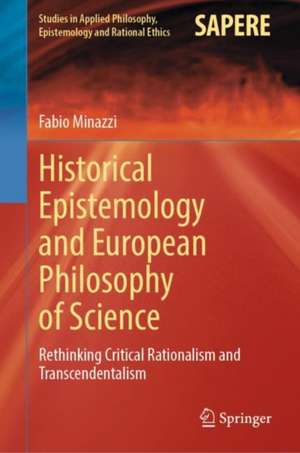Historical Epistemology and European Philosophy of Science: Rethinking Critical Rationalism and Transcendentalism: Studies in Applied Philosophy, Epistemology and Rational Ethics, cartea 62
Autor Fabio Minazzi Traducere de Richard Sadleiren Limba Engleză Hardback – 2 apr 2022
This book offers a comprehensive analysis on the evolution of philosophy of science, with a special emphasis on the European tradition of the twentieth century. At first, it shows how the epistemological problem of the objectivity of knowledge and axiomatic knowledge have been previously tackled by transcendentalism, critical rationalism and hermeneutics. In turn, it analyses the axiological dimension of scientific research, moving from traditional model of science and of scientific methods, to the construction of a new image of knowledge that leverages the philosophical tradition of the Milan School. Using this historical-epistemological approach, the author rethinks the Kantian Transcendental, showing how it could be better integrated in the current philosophy of science, to answer important questions such as the relationship between science and history, scientific and social perspectives and philosophy and technology, among others.
Not only thisbook provides a comprehensive study of the evolution of European Philosophy of Science in the twentieth century, yet it offers a new, historical and epistemological-based approach, that could be used to answers many urgent questions of contemporary societies.
| Toate formatele și edițiile | Preț | Express |
|---|---|---|
| Paperback (1) | 733.15 lei 6-8 săpt. | |
| Springer International Publishing – 4 apr 2023 | 733.15 lei 6-8 săpt. | |
| Hardback (1) | 739.18 lei 6-8 săpt. | |
| Springer International Publishing – 2 apr 2022 | 739.18 lei 6-8 săpt. |
Din seria Studies in Applied Philosophy, Epistemology and Rational Ethics
- 20%
 Preț: 603.89 lei
Preț: 603.89 lei -
 Preț: 397.59 lei
Preț: 397.59 lei -
 Preț: 359.53 lei
Preț: 359.53 lei - 20%
 Preț: 989.96 lei
Preț: 989.96 lei - 24%
 Preț: 787.48 lei
Preț: 787.48 lei -
 Preț: 390.08 lei
Preț: 390.08 lei -
 Preț: 370.88 lei
Preț: 370.88 lei - 15%
 Preț: 641.20 lei
Preț: 641.20 lei - 20%
 Preț: 991.60 lei
Preț: 991.60 lei - 20%
 Preț: 646.95 lei
Preț: 646.95 lei - 15%
 Preț: 653.98 lei
Preț: 653.98 lei -
 Preț: 384.48 lei
Preț: 384.48 lei -
 Preț: 395.47 lei
Preț: 395.47 lei - 18%
 Preț: 1216.95 lei
Preț: 1216.95 lei - 18%
 Preț: 947.50 lei
Preț: 947.50 lei -
 Preț: 388.72 lei
Preț: 388.72 lei -
 Preț: 390.08 lei
Preț: 390.08 lei -
 Preț: 395.09 lei
Preț: 395.09 lei -
 Preț: 394.12 lei
Preț: 394.12 lei - 15%
 Preț: 644.82 lei
Preț: 644.82 lei - 15%
 Preț: 698.15 lei
Preț: 698.15 lei - 18%
 Preț: 1840.91 lei
Preț: 1840.91 lei - 20%
 Preț: 656.84 lei
Preț: 656.84 lei -
 Preț: 389.70 lei
Preț: 389.70 lei - 20%
 Preț: 991.46 lei
Preț: 991.46 lei - 15%
 Preț: 585.73 lei
Preț: 585.73 lei - 15%
 Preț: 711.40 lei
Preț: 711.40 lei - 15%
 Preț: 589.33 lei
Preț: 589.33 lei - 15%
 Preț: 700.42 lei
Preț: 700.42 lei
Preț: 739.18 lei
Preț vechi: 901.44 lei
-18% Nou
Puncte Express: 1109
Preț estimativ în valută:
141.44€ • 147.67$ • 117.06£
141.44€ • 147.67$ • 117.06£
Carte tipărită la comandă
Livrare economică 04-18 aprilie
Preluare comenzi: 021 569.72.76
Specificații
ISBN-13: 9783030963316
ISBN-10: 3030963314
Pagini: 402
Ilustrații: XXVII, 402 p. 4 illus.
Dimensiuni: 155 x 235 mm
Greutate: 0.78 kg
Ediția:1st ed. 2022
Editura: Springer International Publishing
Colecția Springer
Seria Studies in Applied Philosophy, Epistemology and Rational Ethics
Locul publicării:Cham, Switzerland
ISBN-10: 3030963314
Pagini: 402
Ilustrații: XXVII, 402 p. 4 illus.
Dimensiuni: 155 x 235 mm
Greutate: 0.78 kg
Ediția:1st ed. 2022
Editura: Springer International Publishing
Colecția Springer
Seria Studies in Applied Philosophy, Epistemology and Rational Ethics
Locul publicării:Cham, Switzerland
Cuprins
Chapter 1: The epistemological problem of scientific objectivity.- Chapter 2: Axiomatic thought and philosophy from neo-scholasticism to neo-realism.- Chapter 3: For a historical-critical epistemology. From the critique of epistemology to critical epistemology.- Chapter 4: Language and ontology between science and hermeneutics.- Chapter 5: The axiological dimensions of scientific research.- Chapter 6: The ideal models and the problem of the scientific method.- Chapter 7: Epistemology as hermeneutics of knowledge.- Chapter 8: Pragmatism and Objectivity.
Notă biografică
Fabio Minazzi is a full professor of Philosophy of Science at the University of Insubria, Varese, Italy. An authoritative figure in the tradition of the European critical rationalism, he edited about seventy books and authored more than thirty monographs.
Textul de pe ultima copertă
This book offers a comprehensive analysis on the evolution of philosophy of science, with a special emphasis on the European tradition of the twentieth century. At first, it shows how the epistemological problem of the objectivity of knowledge and axiomatic knowledge have been previously tackled by transcendentalism, critical rationalism and hermeneutics. In turn, it analyses the axiological dimension of scientific research, moving from traditional model of science and of scientific methods, to the construction of a new image of knowledge that leverages the philosophical tradition of the Milan School. Using this historical-epistemological approach, the author rethinks the Kantian Transcendental, showing how it could be better integrated in the current philosophy of science, to answer important questions such as the relationship between science and history, scientific and social perspectives and philosophy and technology, among others.
Not onlythis book provides a comprehensive study of the evolution of European Philosophy of Science in the twentieth century, yet it offers a new, historical and epistemological-based approach, that could be used to answers many urgent questions of contemporary societies.
Caracteristici
Offers a comprehensive account of the evolution of European Philosophy of Science Reports on approaches to scientific knowledge, informed by transcendentalism and critical rationalism Discusses in depth the problem of the decline of science from both social and epistemological perspectives
